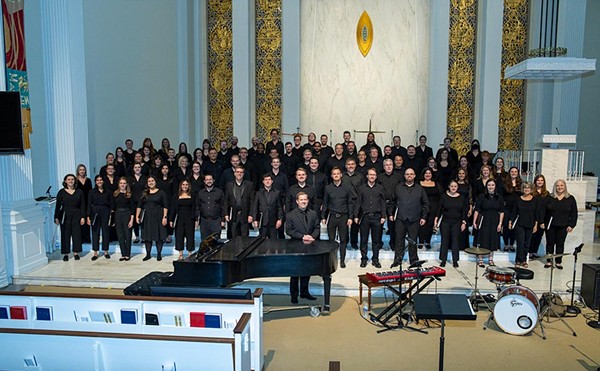Length: 2 hours
Studio: Sony Pictures Classics
Website: http://www.sonyclassics.com/pollock/
Release Date: 2001-03-23
Cast: Ed Harris, Marcia Gay Harden, Amy Madigan
Director: Ed Harris
Screenwriter: Barbara Turner, Susan J. Emshwiller
Music Score: Jeff Beal
WorkNameSort: Pollock
Our Rating: 4.50
When we first see legendary "action painter" Jackson Pollock in the film that bears his name, he's standing inside the Betty Parsons Gallery sometime in the year 1950. A reception is taking place in Pollock's honor, and his eyes are wide with what should be delight but instead looks closer to sheer terror.
That fleeting vignette is a tantalizing bit of foreshadowing, the appetizer for a limited yet liberating biography that follows its subject from his creative emergence in the Greenwich Village of the early 1940s to his death behind the wheel of a drunkenly piloted auto in 1956. As "Pollock" unfolds -- the eventual legend's personal and monetary circumstances struggling to keep up with his artistic prescience -- the initial image of dread stays with us. In the hands of the incomparable Ed Harris, Pollock is all primal instinct, responsive to the rich sensations of jazz, booze and (of course) art, but deathly uncomfortable with the simplest demands of social interaction.
The imbalance is magnified by his relationship with Lee Krasner (Marcia Gay Harden, like Harris an Oscar nominee), the painter who became his wife and staunchest supporter. Early in the film, Krasner arrives at Pollock's door and sets about pursuing his affections. Even when she's luring him into bed, he can barely speak or return her gaze.
With Krasner spurring him on, Pollock gains entry into the court of gallery diva Peggy Guggenheim (a funny Amy Madigan, whose frizzy hair and arms-akimbo posture suggest an illicit union between Elsa Lanchester and Ed Grimley). Pollock's first, fumbling words to her? "I like those earrings." Such "bon mots" don't tend to foster upward mobility, but they remind us that the artist is a virtual alien in his own skin.
He's also given to uncontrollable rages (Harris' stock in trade) that are aggravated by alcoholism. The character's waves of mood established, we watch as he takes up residence in the Hamptons, allegedly to follow his muse but doomed to alienate himself from his life's genuine rewards.
Yet somehow, "Pollock" retains an aura of celebration. Harris' portrayal -- that rare specimen that deserves the plaudit "tour de force" -- holds to a world-wise respect as the story dangles maudlin indulgence in front of him. The actor doesn't take the bait, and that alone vindicates his 10-year push to get the film made. (He also produced and directed.)
A colorful mural in its own right, the movie hurtles past potentially static details on its way from one dramatic episode to another. Visuals and music converge in wonderful studio sequences that show the artist in full creative flight. In an iconic scene, Pollock stands in front of an empty canvas, his silhouette the only break in its (welcoming? defiant?) whiteness.
When it stoops to explain itself, "Pollock" finds trouble. There are better ways to demonstrate our protagonist's career milestones than to have an admirer send up a verbal flare every time he "breaks the ice" or "cracks it wide open." The biggest howler is Krasner's, who looks at one of her partner's works-in-progress and immediately advances a detailed critique that belongs in a master's thesis. OK, she's the more analytical of the two, but it's still easy to side with Pollock when he mutters, "You paint the fuckin' thing," and walks off.
The injunction is more sincere than it sounds. Later, a writer with a similarly rhetorical bent presses Pollock to justify modern art. "Everybody should do what the hell they want to do," he answers. Is that Pollock the pigment-dripping rebel talking, or Harris the driven biographer? Either way, it's a joyful moment in a film that finds its truth in successive doses of crippling fear and glorious will.
















